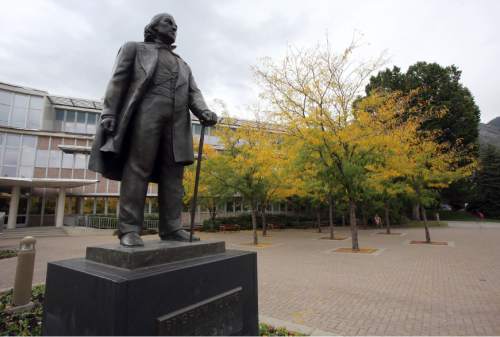This is an archived article that was published on sltrib.com in 2015, and information in the article may be outdated. It is provided only for personal research purposes and may not be reprinted.
Some Brigham Young University students may face fines of up to a few hundred dollars because their school health plan, lacking birth control coverage, no longer passes federal muster.
As of Monday, the BYU plan is too slim to qualify as "minimum essential coverage" under the Affordable Care Act. Health-care advocates, for their part, are trying to calm any anxiety on campus. Other choices with more comprehensive care, they note, are still available.
Students have until Nov. 1 to choose a new plan and avoid paying fees when they file their tax returns.
"We don't really want people running around with their hair on fire, not realizing that there are options out there," said Jason Stevenson, communication director for Utah Health Policy Project.
Stevenson and others note that students can visit healthcare.gov, call 211 or consult health care "navigators" in the Take Care Utah network to review their choices on Utah's marketplace or the federal exchange.
"It gives people plenty of time," said Dodd Greer, a navigator at Community Health Connect in Provo.
The student plan does not comply with the provision of federal law requiring contraception coverage, though it does make some exceptions for students with certain medical conditions such as ovarian cysts, said spokesman Todd Hollingshead.
Hollingshead on Thursday did not explain why the university doesn't cover birth control.
The Church of Jesus Christ of Latter-day Saints, which owns and operates the school of roughly 30,000, leaves it up to married couples in the faith to make their own choices on contraception. The church's own insurer, which covers all LDS Church employees — including BYU faculty — does not cover family-planning devices or medication.
Under the federal health care law, some religious nonprofits are exempt from the mandate to cover contraceptives.
In 2013, the LDS presiding bishop signed an open letter objecting to the health insurance mandate and calling for the ACA to expand "conscience protections" beyond religious nonprofits.
Other schools' health-care plans have come under the spotlight this summer.
The University of Utah's student health plan also could've lost its federal approval, but not because of contraception. The U. scrubbed lifetime limits and added reimbursements for prescriptions to comply with the ACA.
Wheaton College, an Evangelical Protestant Christian school in Illinois, is not offering student insurance this year, citing objection to the contraception mandate.
But BYU's lack of contraception coverage is not the only component of the student plan that presents a problem.
A benefit cap of $250,000 and the school's unwillingness to further restrict administrative spending, Hollingshead said, also do not comply with federal law.
The university estimates that about 10,000 students opted for school coverage this year, but not all will have to pay fines if they don't find other coverage before the Nov. 1 deadline. Students whose income is below the poverty level are not on the hook. The threshold is $11,700, for single students, $15,900 for couples and $20,000 for families of three.
Many students, BYU leaders estimate, forewent purchasing school coverage and will remain on their parents' plans until the cutoff age, 26. But if the students have children, that third generation does not qualify.
Dozens of students have called Community Health Connect with questions, Greer said. He estimates about half are married, some with children.
About one in four BYU students is wed, according to the most recent available statistics, from 2014.
This year's school handbook notified students of the change, but many didn't notice until this week, Greer said.
This fall, Stevenson and Dodd are hoping to help all Utahns — not just college students — find health care plans. And they are getting some extra help this week from federal officials.
On Wednesday, the Center for Medicaid and Medicare Services health officials announced a $920,000 grant for a pair of Utah nonprofits to help the state's residents buy health insurance.
The Utah Health Policy Project is receiving the bulk, taking in $740,000. The money will be used primarily to help residents in Weber, Summit, Wasatch and Washington counties shop on Utah's insurance marketplace at healthcare.gov.
The Urban Indian Center of Salt Lake also is receiving $180,000 from the Center for Medicaid and Medicare Services. The group is aiming to help American Indian residents along the Wasatch Front.
Nationwide, a total of $67 million is being set aside for similar programs.
aknox@sltrib.com @anniebknox



